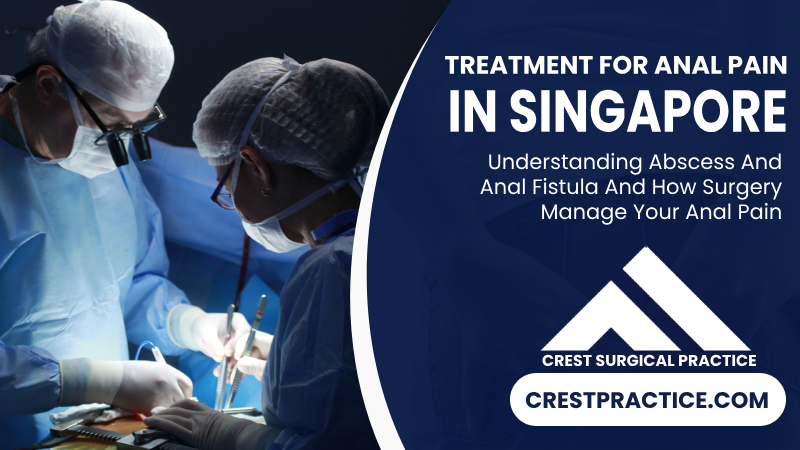Anal pain might be a difficult and often unpleasant subject! But it’s imperative to address these concerns. It is necessary for the benefit of one’s health and well-being. The two most common causes of anal pain are anal fistulas and abscesses. Fortunately, there is a safe surgical treatment option for anal abscesses and fistulas in Crest Surgical Practice. It is the trusted destination for the treatment of anal pain in Singapore.

Anal Abscesses & its treatment:
An anal abscess is a painful condition in which a collection of pus develops & accumulates close to the rectum or anus. It is often caused by a due infection in the anal gland. Severe discomfort, redness, and swelling are some of the symptoms that indicate there is anal fistulas or anal abscesses. Anal fistula formation is one of the problems that can arise from untreated abscesses. It is usually a side effect of an anal abscess!
Treatment Options for Anal Abscesses:
The most common way to treat all kinds of anal abscesses is to cut and drain them surgically. This is usually effective. It is important to do the Anal abscess surgery quickly before the abscess breaks open or erupts. In some cases, antibiotics may be prescribed to address the infection. However, the primary treatment for an anal abscess is typically incision and drainage.
It involves making a small incision to allow the pus to drain, relieving pain and preventing further complications. A doctor can drain superficial anal abscesses in their office with a local anesthetic. For larger or deeper anal abscesses, the procedure needs to be performed under general anesthesia.
Anal Fistulas & its treatment:
A fistula is a complication that happens to about half of the people who have an anal abscess. A fistula is a small tunnel-like passageway that makes an abnormal connection between the site of the abscess and the skin. It forms between the anal canal and the skin near the anus. It is often the result of an untreated or recurrent anal abscess.
Fistulas can cause persistent drainage of pus or stool, pain, and discomfort. There’s no medication to fix the condition. Almost all anal fistulas need surgery to heal. They usually do not get better on their own, so surgery is an option.
Treatment Options for Anal Fistulas:
There are several different procedures. To name a few are Fistulotomy, Seton Placement, advancement flap procedure, LIFT Procedure (Ligation of the Intersphincteric Fistula Tract), Endoscopic ablation, and laser fiber treatment. The best treatment for you will depend on where your fistula is and how many channels it has. You may need to have additional investigation such as MRI to check the area before the treatment. The surgeon will explain the best options. You can choose the one that suits you best.
The surgery for an anal fistula is usually done with a general anesthetic. You may not need to stay in the hospital overnight. The surgery involves opening up the fistula tract. The goal of the anal fistula surgery is to heal the fistula and not damage the sphincter muscles. It allows it to heal from the inside out. There may be temporary pain during the recovery period.
Related Read: Anal Abscess vs. Anal Fistula: What’s the Difference
Conclusion:
If you’re experiencing persistent anal pain or suspect the presence of an abscess or fistula, seeking prompt medical attention is essential. The anal abscesses and fistulas can be uncomfortable and challenging. The level of risk will depend on things like where your abscesses and fistulas are located and the specific procedure you have. Speak to the surgeon at Crest Surgical Practice about the potential risks of the procedure they recommend. They offer effective solutions to alleviate pain and promote healing.


